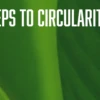Fulfilment activities are the core business of a distribution centre. Online selling fashion and lifestyle brands have to make these activities more sustainable as part of their Corporate Social Responsibility (CSR) strategy. What viable solutions does Bleckmann see for each brand?
In this blog, we look specifically at fulfilment activities. What is fulfilment? And how can fulfilment activities be carried out more sustainably, fitting into the overall picture of Corporate Social Responsibility?
We conclude the article with Bleckmann's concrete sustainable fulfilment solutions.
What is fulfilment?
Fulfilment is the provision of services within a distribution centre. A distribution centre plays a central role within the entire logistics chain that runs from production to end customers and sometimes back to production. This includes a broad pallet of fulfilment services, such as receiving incoming goods (inbound), checking incoming products for quantity and quality, storing goods and managing inventory, order picking according to orders from retailers and end consumers (the pick order process) and shipping to customers.
First, there are standardised services such as warehousing, order picking and parcel delivery.
In addition, logistics companies offer customised fulfilment solutions. For example, the packing of products in a certain way, repairing returns, automating processes and so on.
Green challenges in fulfilment?
On the one hand, logistics players actively chose to operate greener. On the other hand, their customers challenge them to do so. Also, stakeholders such as shareholders and society demand it. And the legislator urges them to pay more attention to making their entire chain more sustainable. Read more about this in the white paper Is your brand ready for mandatory textile circularity?
The current high energy crisis is an extra reason for many companies to consider doing things more sustainably because greener innovations also offer cost savings. Just think of replacing fluorescent lighting with energy-efficient LED lighting. Collecting rainwater lowers water bills. Better insulating buildings lowers heating bills.
Fulfilment is a part of the logistics chain that definitely can be greener. In most warehouses, there are still plenty of opportunities to become greener and to do savings. Even before the energy crisis, margins were already low, making it challenging to invest heavily in sustainability. However, today, the increasingly loud demands from brands and the high energy prices make sustainability an interesting route for cost-conscious companies too.
There are more and more ways to make the fulfilment process more sustainable.
We look at some of the solutions in this blog:
Opportunities to make fulfilment more sustainable
Every stage of the fulfilment process has opportunities to become greener.
There are many practicable solutions, small and large. An overview:
Fulfilment services in circular distribution centres
It has the most impact to choose a distribution centre or logistics partner which is already sustainable, for example, because all energy is generated locally by solar panels.
At Bleckmann, we are taking a big step in this direction thanks to solar panels and the construction of the Netherlands' largest circular distribution centre in Almelo. We will make all its fulfilment activities more sustainable and consequently reduce our group's ecological footprint significantly.
Measurements sustainability criteria
Existing distribution centres too can make their fulfilment services greener. To know the impact of sustainable investments, it is helpful to quantify sustainability criteria such as energy consumption, waste streams and CO2 footprint. Fulfilment customers can ask for these figures. For example, how much CO2 does the shipment for my brand emit? The saying 'measuring is knowing' particularly applies to corporate social responsibility.
Integrating sustainability into the corporate culture
It's good to integrate sustainability in the management of goods, in storage and order picking. It is even better to incorporate sustainability into the whole corporate culture and in every employee's mind. That way, many more opportunities open up to increase the sustainability of all of the company's activities and realise energy consumption savings.
Some opportunities: Ask people to look for continuous improvements. Ensure that lights that used to stay on are turned off. Make sure computers and machines are switched off after working hours. Close doors which used to stay open.
When sustainability is incorporated into the corporate culture, many small efforts are automatically made. And it's a fact that many small actions and improvements all together make a big difference.
In addition, sustainability is a magnet for talent. Young people prefer to work in organisations with sustainability as one of their core values. Subsequently, these talents will contribute to a more sustainable fulfilment process.
Eco-friendly packaging solutions
Packaging goods is an important activity in a fulfilment centre. A lot of plastic and cardboard are needed in logistics.
A shift takes place in this domain too. Today, the most progressive brands indicate they no longer want to send plastic, as packaging and shipping can be perfectly done with environmentally friendly materials. That challenges logistic companies to evolve towards more sustainability.
For classic plastic polybags, there are paper alternatives. Or what about the bagless option? (Pay attention: think of informing consumers about it, as they are used to clothes packed in plastic bags). There are also eco-friendly alternatives for the plastic tape and foils wrapped around pallets; think of paper tape, paper stretch film and pallet straps, which are super-strong tie rips made of cardboard. These can replace the foil wrap around a pallet.
The plastic waste in our company is collected and recycled as much as possible through sophisticated waste management. By sorting and baling plastic by type, we significantly reduce volumes and consequently also the transport to waste processing companies. Sorting not only has a positive impact on the environment, but it also reduces the number of truck kilometers on the road.
Upgrading returns
When sustainability is prioritised in the logistics chain, returns can no longer be seen as just a loss. Returned goods cannot be thrown away. Instead, they are upgraded and reintroduced to the market afterwards.
Sustainable fulfilment involves providing solutions that make returns ready for sale again. This can require a variety of operations. Some products are in perfect condition and need no more than checking and repackaging. Other products, like returned clothes, must be washed, steamed or ironed. And some clothing is damaged and needs to be repaired, for example, by The Renewal Workshop.
New solutions for sustainable innovations
We are aware that there is still much potential in making fulfilment services more sustainable. Loyal to our continuous improvement approach, we are steadily making our warehouses more sustainable. For example, we invest in the largest circular distribution centre in the Netherlands, in solar panels, LED lighting, managing waste streams, and so on.
As a result, every product we bring in and every parcel we send out has a lower carbon footprint than before. Thanks to the brand-new dashboards, we track changes in energy consumption, CO2 emissions and waste. For every customer, we examine our processes with the central question: Can the fulfilment activity be done more efficiently? How can we reduce CO2 emissions, waste volume and energy consumption?
As we continue to strive for excellence, we will be able to offer significantly more solutions in the future.
Thinking together about a greener fulfilment
Some clients ask us to work as sustainably as possible. We integrated a lot of the features mentioned above for them.
For example, the products of customers who no longer wish to send plastic are wrapped in paper packaging with paper film. Many customers ask us to process their returns into resalable products. We are working to reduce our overall energy consumption. We also replaced plastic coffee cups with paper cups at a customer's suggestion. We invested in flower meadows for clients who value greenery around their sites. And we do not only look for innovative ideas and solutions with our customers. We also do so with our suppliers.
Do you have specific requirements? Contact your fulfilment partner Bleckmann and find out how we can help you become more sustainable. Or stimulate and question us by telling us about the sustainable innovations being developed in your organisation. We are ready to find out how our fulfilment can connect with them. Together we can work on improvements and a smaller carbon footprint.
Contact our account managers
Call or email us with your questions and requirements. We will happily schedule a meeting around the sustainable fulfilment solutions your brand is looking for.













